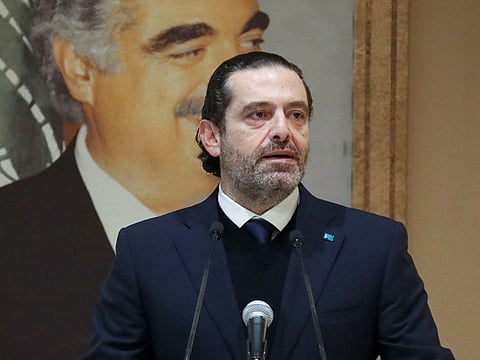Tensions within Sunni community on the rise in Lebanon as elections near
Siniora urges Sunni Muslims to fully participate in polls while Hariri seeks boycott

Damascus: All is not well with the Sunni community of Lebanon, as tension rises between former Prime Minister Fouad Siniora and his friend, colleague, and successor, Saad Hariri.
On February 23, Siniora, aged 79, called on Lebanese Sunnis not to boycott the upcoming parliamentary elections, scheduled for 15 May. Voting was a “national duty,” he stressed, in order to break Hezbollah’s tutelage over Lebanon. Sunnis should take part in the elections, he added, “both as voters and candidates,” and only then would they be able to “reclaim the state and its independence.”
Siniora’s statement seemed to contradict heavily with Hariri’s decision to boycott the elections, announced at a press conference last January. Hariri had made it clear that he nor any members of his Future Movement will take part in the elections, also announcing that he would be retiring from politics.
Not a coup
Speaking to reporters one month later, Siniora stressed that his initiative was not a coup against the Hariri family, with whom he has worked since the 1990s, and to whom he owes his entire wealth, and political career.
Born in Sidon in 1943, Siniora studied at the American University of Beirut (AUB) and began his professional life first in academia, and then at Citibank. A life-long friend of Rafik Hariri, he entered politics through him in 1992, serving as minister of state for financial affairs, then as minister of finance in 2000-2004.
When Hariri was assassinated on February 14, 2015, Siniora was appointed prime minister of Lebanon, a position he held until stepping down in favour of Hariri’s son and political heir, Saad.
During his tenure at the premiership (2005-2009), Siniora entered into back-to-back confrontations with Hezbollah, blaming them for Hariri’s murder. He also criticised them for triggering the 2006 war with Israel and then tried to dismantle their telecommunications network at Rafik Hariri International Airport in May 2008.
That incident led to violent confrontations between Hezbollah and its opponents, triggering a mini civil war in Beirut.
Resentment within Future Movement
Shortly after Siniora made his call to Lebanese Sunnis, Ahmad Hariri, secretary-general of the Future Movement, posted a photo of his cousin on Twitter saying: “Only your position represents me.”
It was an indirect way of saying that Siniora’s position does not represent Hariri loyalists, or the former Prime Minister.
Behind closed doors, they are criticising Siniora’s deviance, accusing him of violating orders of his former boss while trying to inherit leadership of the Sunni community.
Siniora continues to deny these accusations, insisting that his only desire is to save the Sunnis of Lebanon and prevent further Hezbollah entrenchment in Lebanese Parliament. His refusal of a Sunni boycott of the elections was echoed by Sunni Mufti Abdul Latif Daryan and Beirut MP Fouad Al Makhzoumi, who tweeted that Lebanese Sunnis “will not orphaned” without Hariri.
Siniora’s campaign
Turning a deaf ear to his critics, Siniora headed to Paris in mid-March to meet with expatriate Lebanese voters, encouraging them to vote in large numbers. There are 225,000 eligible voters in the Diaspora, 45,000 of whom are Sunni Muslims.
Domestically, he has teamed up with his old friends, Druze leader Walid Jumblatt, president of the Social Progressive Party, and Samir Geagea of the Lebanese Forces (LF), two ardent critics of Hezbollah.
They are currently putting the final touches on their joint campaign lists, although Siniora himself announced that he won’t personally be running for Parliament. Leading his list instead will be ex-minister and judge, Khaled Qabbani.
Siniora’s decision to stay out of the race was with the aim of “making room for a new generation,” he said on March 15. He would continue to stand behind Lebanese Sunnis, he added, as “a responsible citizen working for all of Lebanon.”
His final decision to stay out of the race means that no ex-premier will be taking part in the next elections, after similar announcements were made by his two successors, Tammam Salam and the incumbent, Najib Mikati.
Future defections
Two months ahead of the elections, it is becoming clear that not all members of the Future Movement are going to abide by Hariri’s desired boycott. Many have their own political ambitions, after all, with or without Saad Al Hariri.
On March 13, the Future Movement came out with an official statement, asking all members who want to take part in the elections to resign from the party first, and to refrain from using the party name or any of its symbols in their election campaign.
The first to reply promptly was Mohammad Alloush, vice-president of the Future Movement. A surgeon-turned politician from the northern city of Tripoli, he has worked with the Hariri family since the 1990s and was one of the founders of the Future Movement with Rafik Hariri.
He has now teamed up with Siniora and will be running for a parliamentary seat in his native Tripoli.
Alloush had become increasingly critical of Saad Hariri in recent years, notably for the 2016 deal that he hammered out with Hezbollah, making Michel Aoun president in exchange for returning to the premiership, with Hezbollah backing.
Sign up for the Daily Briefing
Get the latest news and updates straight to your inbox



